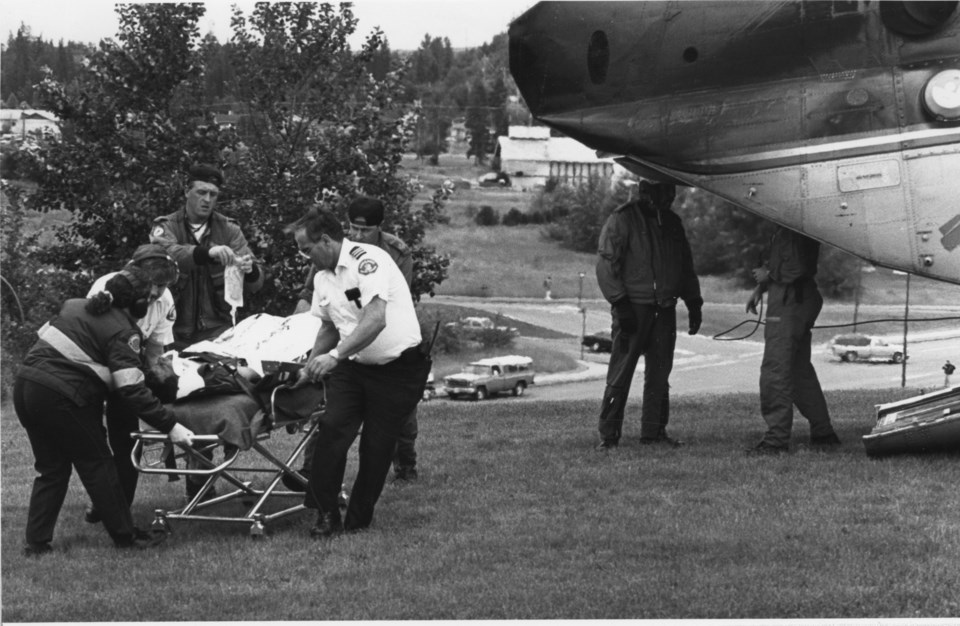Air ambulances will be able to land and take off from the University Hospital of Northern BC under a new NDP campaign promise to build a helipad for the facility.
The hospital in Prince George has been without a helipad since 1993. Currently, air ambulances are based at the Prince George International Airport, with patients transported from there to the hospital by land ambulance.
This follows the announcement Aug. 9 of business plan approval for the hospital's new patient care tower. The 11-storey building will cost $1.579 billion, with construction expected to get started in the fall of 2026 and be ready by the summer of 2031.
At that time, then-Health Minister Adrian Dix told The Citizen there was no plan for a helipad.
But that has changed. Eby told The Citizen in an interview Tuesday that he made the decision after meeting with Mayor Simon Yu and members of council at the Union of BC Municipalities convention in Vancouver Sept. 16-20.
“They really underlined the need for the helipad,” he said. “It made a lot of sense to me.”
He noted that UHNBC services a vast, remote area and provides care to people in need of emergency surgery, acute care and assistance with difficult births. Having faster access to the hospital via an on-site landing pad is the right call, he said, particularly when lives may be at risk.
Eby said the planning for the helipad would be folded into the existing business plan for the tower. Other than that, he said there’s not much more he can confirm at this early stage. That includes information on the actual location of the proposed pad.
“Some are suggesting it should go on top of the tower, some (saying) ground level,” he said, adding he would like to see it “sooner rather than later.”
This early uncertainty includes cost and the funding model. “We’ll figure that out,” he said. The tower is being funded both by the province and the Regional District of Fraser-Fort George.
Former Prince George-Valemount MLA Shirley Bond, a longtime advocate for both the surgical tower and the helipad, said Tuesday she was glad to hear the NDP's commitment, adding that she had always seen a level of support from Eby and Dix in discussions about the subject. She said she's optimistic but will have to see how the plan unfolds should the NDP be re-elected.
"Our concern is that it's fully funded and it doesn't delay the expansion of the hospital," she said, calling on her successor and other elected representatives to make sure the helipad stays a priority.
"The MLAs that are elected here in the north will have to keep the pressure on," she said.
BC Conservative Leader John Rustad said the helipad makes sense.
"There's no doubt in my mind that the health care in Prince George is in desperate need of improvement," he told The Citizen. "There are things that have been needed for a long, long time."
As Prince George is a regional hub, it only makes sense that its only hospital has a helipad, he said. However, he's wary of the NDP's health-care strategy.
"The NDP is promising to build facilities across the province, but facilities don't provide health care," he said. "People provide health care." And there's no real NDP plan to address significant health-care staffing shortages in the province, he added.
Eby said local air ambulance service will see improvement long before the helipad is built.
The area will have a new Leonardo AW169 helicopter in service, based at the airport, in the months ahead.
With a longer range and requiring fewer refuelling stops, the Leonardo is suited for trips into more remote sections of the province.
Also Tuesday, Eby made two other health-care promises. One would lead to improved access to out-of-town medical care, while the other would extend job protection for people fighting serious illnesses.
Eby said the NDP would expand the Travel Assistance Program to allow mileage claims for road trips for medical reasons where flights are either not available or not feasible. The program would cover the cost of mileage and pay it up front.
As well, saying nobody should worry about losing their job while dealing with serious illnesses like cancer, he said a re-elected NDP government would extend job protection for people in medical crises from eight days to 27 weeks. This would be in line with current federal standards, he said.



